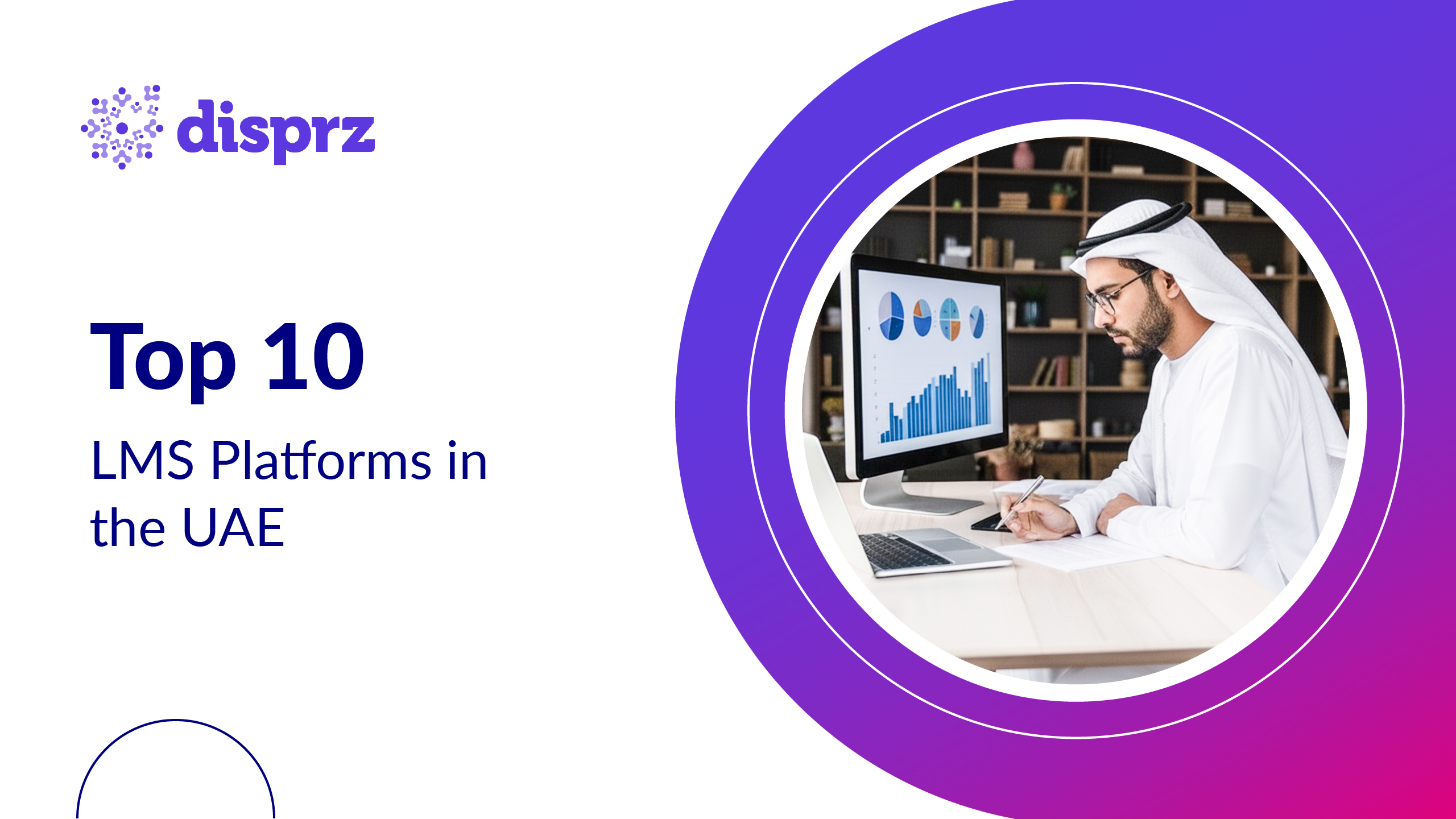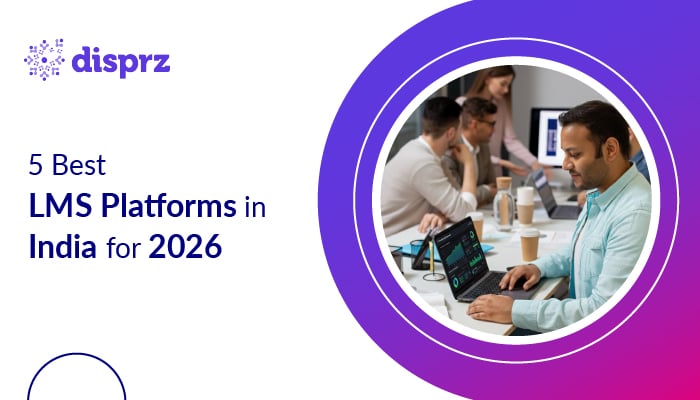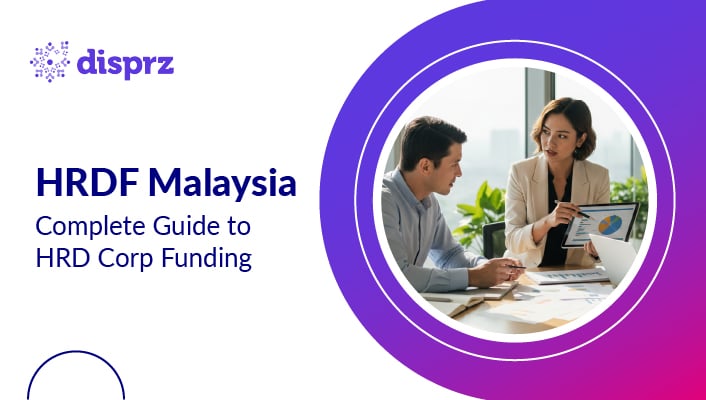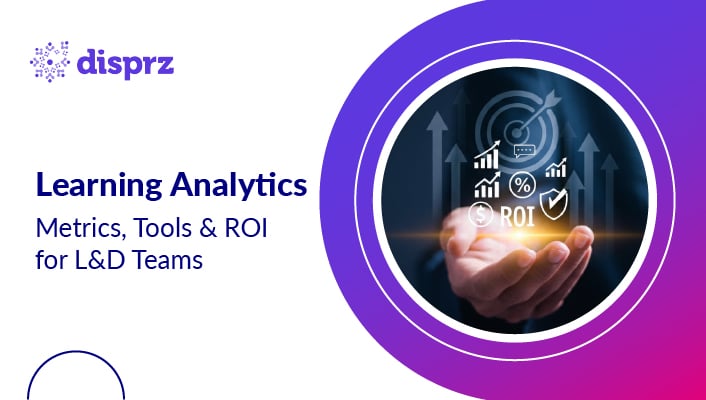This guide compares the top LMS platforms in the UAE for 2026, helping organizations choose the right learning management system based on compliance, scale, and workforce strategy.
We cover the best LMS platforms in UAE, including enterprise and mobile LMS options, with a focus on Arabic/RTL (Right-to-Left Interface) support, UAE PDPL (Personal Data Protection Law) LMS compliance, integrations, and pricing models.
You’ll also find practical decision frameworks, real-world UAE use cases, and an implementation roadmap to match each LMS software to business needs; whether for Emiratization, frontline training, or enterprise-wide skilling.
What Is a Learning Management System (LMS) and Why Does It Matter in the UAE?
A Learning Management System (LMS) is a digital platform that enables organizations to design, deliver, track, and optimize learning and training programs. Traditionally used for hosting online courses and compliance training, modern LMS platforms in the UAE have evolved into intelligent, data-driven systems that support continuous skill development, performance tracking, and workforce transformation.
Evolution of LMS Platforms
Early LMS solutions focused primarily on course administration, enrollments, completion tracking, and basic reporting. Today’s LMS offerings in the UAE integrate AI, analytics, and mobile-first design to support personalized learning paths, skills intelligence, and measurable business outcomes. As a result, LMS platforms now sit at the core of enterprise talent and training strategies.
Why LMS Matters Specifically in the UAE
Several UAE-specific factors are accelerating LMS adoption and redefining expectations from learning software:
-
UAE Vision 2031: Organizations are expected to invest in digital skills, leadership development, and future-ready capabilities at scale.
-
UAE PDPL (Personal Data Protection Law): Enterprises must ensure learner data is handled securely and in compliance, making PDPL-ready LMS software a necessity.
-
Emiratization mandates: Organizations need structured, role-based training and skills analytics to develop national talent effectively.
-
AI and digital transformation initiatives: Government and enterprise programs increasingly mandate measurable upskilling outcomes rather than activity-based learning.
LMS vs Learning Software vs Training Platform
While these terms are often used interchangeably, there are practical differences:
-
LMS in the UAE: Focuses on structured learning delivery, tracking, compliance, and analytics.
-
Learning software in the UAE: A broader term that may include content libraries, authoring tools, or skill platforms.
-
Training management system in the UAE: Often emphasizes scheduling, certifications, and instructor-led training logistics.
Modern UAE-based enterprise LMS platforms increasingly combine all three capabilities into a single, integrated system.
Key Insight: LMS platforms in the UAE are no longer just tools for course delivery. They are strategic enablers for workforce readiness, regulatory compliance, and long-term national talent development.
LMS Requirements Unique to UAE Organizations in 2026
Organizations operating in the UAE face distinct regulatory, cultural, and workforce challenges. As a result, choosing the right LMS software in the UAE requires evaluating capabilities that go beyond generic global features.
Below are the core requirements that define the best LMS for 2026.
Arabic Language & Right-to-Left Interface (RTL)
A true Arabic LMS must go beyond content translation. It should offer:
-
Full Right-to-Left (RTL) user interface support across web and mobile
-
Arabic-first navigation, menus, notifications, and reports
-
Seamless switching between Arabic and English for diverse workforces
Platforms that only translate course content (while retaining a left-to-right UI) often see lower adoption and engagement among Arabic-speaking learners.
UAE Data Privacy Compliance (PDPL)
With the enforcement of the UAE Personal Data Protection Law, UAE PDPL LMS compliance is now a non-negotiable requirement.
-
Organizations must ensure their LMS supports:
-
Secure learner data storage and processing
-
Role-based access controls and audit trails
-
Clear consent management and data retention policies
-
Options for regional hosting or compliant data transfer mechanisms
Failure to align with PDPL can expose enterprises to regulatory and reputational risks.
Mobile and Offline Learning for Deskless Workforces
Industries such as retail, logistics, construction, and hospitality rely heavily on frontline and deskless employees. For these teams, a mobile LMS is critical:
-
Native mobile apps with offline learning capabilities
-
Sync-on-connect functionality for low-connectivity environments
-
Microlearning formats optimized for short attention spans
Mobile-first design directly impacts training completion and real-world skill application.
Emiratization Support (Skill Analytics & Role-Based Training)
To support national workforce goals, organizations need LMS platforms that enable:
-
Role-based learning paths aligned to Emiratization objectives
-
Skills mapping and competency frameworks
-
Analytics to track readiness, progression, and gaps among national talent
The best LMS platforms in UAE increasingly act as skill intelligence systems, not just training repositories.
Integration with HR & Business Systems
Modern enterprise LMS deployments must integrate seamlessly into existing ecosystems:
-
HRIS and ERP systems such as SAP and Oracle
-
Collaboration tools such as Microsoft Teams
-
Identity management and performance systems
Strong integrations reduce manual work, improve data accuracy, and connect learning outcomes to business performance.
LMS Must-Haves for UAE Enterprises (Quick Checklist)
-
Full Arabic & RTL interface (not content-only)
-
UAE PDPL–ready data privacy and security controls
-
Mobile and offline learning support
-
Emiratization-aligned skills and role analytics
-
Enterprise-grade integrations (SAP, Oracle, Teams, etc.)
-
Scalable reporting and ROI measurement
Meeting these criteria is essential for any organization evaluating LMS platforms in the UAE in 2026.
Best LMS Software in UAE for 2026: Quick Comparison
The table below provides a high-level comparison of the best LMS platforms in UAE, mapped against the capabilities that matter most to UAE-based organizations in 2026; Arabic support, mobility, compliance readiness, and enterprise integrations.
| LMS Platform | Best For | Arabic / RTL | Mobile Access | Compliance Tools | Key Integrations |
|---|---|---|---|---|---|
| Disprz | Skills-first enterprise L&D, large organizations | Full Arabic & RTL | Native mobile & offline | PDPL-ready, audit trails | SAP, Oracle, Microsoft Teams |
| Moodle | Customizable, open-source deployments | Partial (theme-based) | Mobile app | Depends on setup/plugins | HRIS, plugins via API |
| TalentLMS | SMBs and quick cloud deployments | Arabic supported, limited RTL | Mobile app | Basic compliance tracking | Zapier, Salesforce |
| Canvas | Academic and structured learning environments | Limited RTL | Mobile app | Education-focused compliance | SIS, LTI tools |
| iSpring Learn | PowerPoint-driven corporate training | Arabic content, limited UI RTL | Mobile app | Basic reporting | HR systems, iSpring Suite |
| SAP Litmos | SAP-centric enterprise compliance training | Arabic support varies | Mobile app | Strong compliance workflows | SAP, HRIS tools |
| Paradiso LMS | Feature-rich, integration-heavy use cases | Partial RTL | Mobile app | Compliance via add-ons | Salesforce, Teams, APIs |
| 360Learning | Collaborative and peer-driven learning | Limited Arabic / RTL | Mobile app | Limited formal compliance | HRIS, collaboration tools |
| Adobe Learning Manager | Content-rich digital learning experiences | Arabic supported, partial RTL | Mobile app | Enterprise-grade reporting | Adobe ecosystem, APIs |
| Blackboard | Large institutions, academic-style training | Partial RTL | Mobile app | Education-focused controls | SIS, enterprise connectors |
How to read this table:
-
Arabic/RTL is critical for learner adoption in the UAE; full UI support matters more than content translation alone.
-
Compliance tools indicate readiness for regulated industries and PDPL-aligned governance.
-
Integrations highlight how easily the LMS fits into enterprise IT and HR ecosystems.
This comparison sets the context for the detailed platform-by-platform breakdown that follows.
Top 10 LMS Platforms in UAE for 2026
Below is a detailed, side-by-side evaluation of the best LMS platforms in UAE, using a consistent framework to help organizations compare strengths, limitations, and ideal use cases.
1) Disprz: Best for Skills-First Enterprise L&D
Disprz is a next-generation enterprise LMS built for organizations shifting from activity-based training to outcome-driven workforce development. The platform combines learning delivery with skills intelligence, enabling enterprises to link training directly to role readiness, performance, and business goals. It is designed for complex, regulated, and multilingual environments common across the UAE.
Strengths
-
Built for UAE PDPL LMS compliance with enterprise-grade security and governance
-
AI-curated, role-based learning paths aligned to business and Emiratization goals
-
Deep integrations with SAP, Oracle, and Microsoft Teams
-
Strong Arabic LMS support with full RTL interface
-
Mobile-first design with offline learning for frontline teams
Pros
-
Skills intelligence and analytics tied to job roles
-
High learner engagement across deskless and knowledge workers
-
Scales well for large, distributed enterprises
Cons
-
May be more robust than needed for very small teams
-
Requires structured rollout for maximum ROI
Ideal for
Mid-to-large enterprises focused on workforce transformation, Emiratization, and measurable business outcomes.
Not ideal for
Small teams seeking a basic course-hosting tool.
Explore how Disprz supports workforce transformation aligned with the UAE’s Vision 2031.
2) Moodle
Moodle is one of the world’s most widely adopted open-source LMS for UAE deployments, known for its flexibility and extensibility. It allows organizations to build highly customized learning environments using themes, plugins, and third-party integrations. In the UAE, Moodle is often chosen by institutions with strong internal technical capabilities.
Strengths
-
Open-source with strong global community support
-
Highly customizable through themes and plugins
-
Suitable for organizations with in-house technical teams
Pros
-
No licensing fees for the core platform
-
Flexible content and assessment options
Cons
-
Arabic and RTL support depend heavily on customization
-
PDPL compliance and analytics require additional configuration
Ideal for
Institutions or enterprises with strong internal IT capabilities.
Not ideal for
Organizations seeking a managed, enterprise-ready LMS out of the box.
3) TalentLMS
TalentLMS is a cloud-based LMS designed to help organizations launch digital training programs quickly with minimal setup. Its clean interface and straightforward feature set make it accessible for teams new to online learning. In the UAE market, it is commonly adopted by small and mid-sized businesses prioritizing speed over customization.
Strengths
-
Easy setup and intuitive UI
-
Quick rollout for standardized training programs
Pros
-
Affordable pricing for SMBs
-
Mobile access for learners
Cons
-
Limited Arabic LMS and RTL experience
-
Basic analytics and compliance features
Ideal for
Small to mid-sized organizations launching digital training quickly.
Not ideal for
Enterprises with advanced analytics or Emiratization requirements.
4) Canvas
Canvas is a learning platform originally developed for higher education but increasingly adapted for structured corporate learning environments. It emphasizes course design, assessments, and learner engagement through a modern interface. In the UAE, Canvas is typically used by academic institutions or organizations running formal, curriculum-based training programs.
Strengths
-
Strong course design and assessment tools
-
Reliable mobile applications
Pros
-
Scales well for structured programs
-
Familiar to education-focused teams
Cons
-
Limited enterprise L&D features
-
Partial Arabic and RTL support
Ideal for
Educational institutions or corporate academies with academic-style training.
Not ideal for
Organizations focused on enterprise skilling and compliance.
5) iSpring Learn
iSpring Learn is a corporate LMS that focuses on rapid course creation and ease of administration. It is closely integrated with PowerPoint-based authoring, making it attractive for teams converting existing classroom materials into digital formats. UAE-based organizations often use iSpring Learn for straightforward internal training initiatives.
Strengths
-
Easy conversion of presentations into courses
-
Fast deployment and simple administration
Pros
-
User-friendly for trainers
-
Mobile access supported
Cons
-
Limited enterprise analytics
-
Partial Arabic UI support
Ideal for
Teams prioritizing rapid content creation from existing materials.
Not ideal for
Large enterprises that require advanced reporting and integrations.
6) SAP Litmos
SAP Litmos is an enterprise-grade LMS designed with a strong emphasis on compliance, standardization, and scalability. It is particularly popular among organizations already using SAP’s HR and ERP ecosystem. In the UAE, SAP Litmos is frequently deployed for compliance-heavy training environments.
Strengths
-
Strong compliance and certification workflows
-
Integration with SAP ecosystems
Pros
-
Enterprise-ready security and scalability
-
Suitable for regulated industries
Cons
-
Arabic and RTL support varies by module
-
Customization can be limited outside SAP stack
Ideal for
Enterprises are already invested in SAP solutions.
Not ideal for
Organizations needing deep Arabic UX or offline-first learning.
7) Paradiso LMS
Paradiso LMS positions itself as a feature-rich LMS in the UAE with a broad integration ecosystem. It supports multiple deployment models and a wide range of learning formats, including classroom, virtual, and self-paced learning. UAE-based organizations often consider Paradiso when integration flexibility is a primary requirement.
Strengths
-
Broad integration marketplace
-
Support for multiple learning formats
Pros
-
Flexible deployment options
-
Supports extended enterprise use cases
Cons
-
Partial Arabic and RTL experience
-
Feature complexity can impact usability
Ideal for
Organizations with diverse integration needs.
Not ideal for
Teams prioritizing simplicity and learner adoption.
8) 360Learning
360Learning is a modern LMS focused on collaborative and peer-driven learning models. The platform enables subject matter experts to create and share content quickly, promoting internal knowledge exchange. In the UAE, it is typically used by organizations with strong knowledge-sharing cultures rather than formal compliance needs.
Strengths
-
Strong social and collaborative features
-
Modern, intuitive interface
Pros
-
Encourages knowledge sharing
-
Quick content creation workflows
Cons
-
Limited Arabic and RTL support
-
Restricted formal compliance tracking
Ideal for
Organizations emphasize peer learning and internal knowledge sharing.
Not ideal for
Regulated industries or Arabic-first workforces.
9) Adobe Learning Manager
Adobe Learning Manager is a digital learning platform built for content-rich and media-driven training experiences. It integrates tightly with Adobe’s broader content ecosystem to deliver engaging learner journeys. UAE-based enterprises often adopt it when content quality and branding are high priorities.
Strengths
-
Strong multimedia and content management
-
Integration with Adobe tools
Pros
-
Scalable for large learner bases
-
Modern learner experience
Cons
-
Partial RTL support
-
Advanced analytics may require add-ons
Ideal for
Enterprises with strong content and media-driven learning strategies.
Not ideal for
Organizations needing deep skills intelligence or Emiratization analytics.
10) Blackboard
Blackboard is a long-established learning platform with deep roots in academic and institutional training. It is designed to support large learner populations with structured courses and assessments. In the UAE, Blackboard is primarily used by universities and organizations running formal education-style programs.
Strengths
-
Proven scalability for large institutions
-
Structured learning and assessment tools
Pros
-
Reliable for formal programs
-
Mobile access supported
Cons
-
Education-centric design
-
Limited enterprise analytics and Arabic UX depth
Ideal for
Large institutions and academic-style training environments.
Not ideal for
Modern enterprise L&D and workforce skilling initiatives.
How to Choose the Right LMS in UAE (Decision Framework)
Selecting the right LMS in the UAE requires aligning platform capabilities with national regulations, workforce composition, and business goals. Rather than choosing based on brand recognition or feature volume, UAE-based organizations should evaluate LMS platforms through a use-case–driven lens.
Below is a practical decision framework to help narrow down the best LMS platforms in UAE based on priority needs.
If You’re Focused on Emiratization and Government Contracts
Organizations supporting Emiratization initiatives or working on government-linked projects must demonstrate structured talent development and measurable outcomes.
What to prioritize:
-
Role-based learning paths aligned to national job frameworks
-
Skills analytics to track readiness and progression of Emirati talent
-
UAE PDPL LMS compliance with strong governance controls
-
Arabic-first learner experience with full RTL support
Best fit:
-
Enterprise LMS platforms that combine learning delivery with skills intelligence and analytics
If You’re Scaling Digital Training for 500–5,000 Employees
Mid-to-large organizations expanding across regions or business units need an LMS that scales without increasing administrative overhead.
What to prioritize:
-
Cloud-based architecture with proven scalability
-
Automation for enrollments, certifications, and reporting
-
Integration with HRIS and collaboration tools
-
Consistent mobile LMS experience for all roles
Best fit:
-
Enterprise-ready LMS software with strong integrations and centralized administration
If You Need Advanced Analytics & Business Outcome Tracking
For organizations measuring training ROI and linking learning to performance, analytics capabilities are critical.
What to prioritize:
-
Skills-based dashboards and competency tracking
-
Role and business-unit level insights
-
Exportable reports for leadership and audits
-
Integration with performance and talent systems
Best fit:
-
LMS platforms in the UAE designed for skills-first or outcome-driven learning models
If You Need Offline-First & Arabic Frontline Readiness
Frontline-heavy industries such as retail, logistics, construction, and hospitality require a different LMS approach.
What to prioritize:
-
Native mobile apps with offline learning support
-
Microlearning optimized for short, task-based training
-
Full Arabic and RTL user experience
-
Simple UI to drive adoption among non-desk workers
Best fit:
-
Mobile-first LMS software built for deskless and distributed teams
Decision Matrix: Matching Needs to the Right LMS
| Need | Best Fit | Why |
|---|---|---|
| Emiratization & government alignment | Skills-first enterprise LMS | Tracks role readiness, skills progression, and compliance |
| Large-scale workforce training | Scalable enterprise LMS | Handles growth with automation and integrations |
| ROI and performance analytics | Analytics-driven LMS platforms | Connects learning data to business outcomes |
| Frontline, mobile, offline learning | Mobile LMS | Enables anytime learning with high adoption |
| Arabic-first workforce | Arabic LMS with full RTL | Improves usability and engagement |
This framework helps organizations move from feature comparison to strategic LMS selection, ensuring the chosen platform supports UAE-specific regulatory, cultural, and workforce priorities.
LMS Implementation Plan for UAE Enterprises (30/60/90 Day Roadmap)
A structured implementation plan is critical to ensuring your LMS delivers measurable value; not just adoption. Below is a practical 30/60/90 day roadmap designed for UAE enterprises, accounting for PDPL compliance, Arabic enablement, and enterprise-scale rollout.
30 Days: Define Goals & Select Platform
The first phase focuses on strategic alignment and platform readiness rather than configuration.
Key activities:
-
Define business objectives (Emiratization, compliance, frontline productivity, leadership development)
-
Identify learner segments by role, region, and language
-
Finalize LMS selection based on UAE-specific requirements (PDPL, Arabic/RTL, mobile)
-
Validate data hosting, privacy, and security controls
-
Establish success metrics (adoption, completion, skill readiness)
Outcome:
-
Clear LMS goals aligned to UAE-specific business and regulatory priorities
-
Finalized LMS software selection with executive buy-in
60 Days: Integrate, Migrate Content, Train Admins
This phase focuses on technical setup and operational readiness.
Key activities:
-
Integrate LMS with HR systems (SAP, Oracle) and collaboration tools (Microsoft Teams)
-
Configure Arabic and English interfaces, roles, and permissions
-
Migrate legacy content and map learning paths to job roles
-
Set up reporting dashboards and compliance tracking
-
Train administrators, L&D teams, and business stakeholders
Outcome:
-
Fully configured enterprise LMS ready for pilot deployment
-
Admin teams equipped to manage and scale the platform
90 Days: Rollout by Region/Role, Track ROI
The final phase emphasizes adoption, measurement, and optimization.
Key activities:
-
Launch LMS in phases by role, business unit, or geography
-
Enable mobile and offline access for frontline teams
-
Monitor adoption, engagement, and completion metrics
-
Track skills progression and compliance status
-
Gather feedback and optimize learning journeys
Outcome:
-
High learner adoption across Arabic and English audiences
-
Early visibility into training ROI and workforce readiness
30/60/90 Day Implementation Timeline (At a Glance)
| Timeline | Focus Area | Key Deliverables |
|---|---|---|
| 0–30 Days | Strategy & Selection | Goals, LMS selection, PDPL validation |
| 31–60 Days | Setup & Enablement | Integrations, content migration, admin training |
| 61–90 Days | Rollout & Measurement | Phased launch, adoption tracking, ROI insights |
A phased approach like this reduces risk, improves adoption, and ensures your LMS delivers long-term business impact.
Common Pitfalls in Choosing an LMS in UAE (And How to Avoid Them)
Despite growing investment in digital learning, many UAE-based organizations fail to realize full value from their LMS platforms due to avoidable selection and implementation mistakes. Understanding these pitfalls early can help ensure long-term adoption, compliance, and ROI.
Ignoring Arabic UX vs Content-Only Translation
The pitfall:
Choosing an LMS that supports Arabic course content but retains a left-to-right interface and English navigation.
Why it matters:
Learners experience usability friction, leading to low adoption; especially among frontline and Arabic-first employees.
How to avoid it:
Prioritize an Arabic LMS with full RTL UI support across dashboards, menus, reports, and mobile apps.
Choosing Feature-Rich Tools Without Local Support
The pitfall:
Selecting a globally popular LMS without evaluating regional implementation and support capabilities.
Why it matters:
Delayed responses, limited onboarding guidance, and lack of regional expertise can stall rollout and adoption.
How to avoid it:
Assess vendor presence, regional partners, and experience with enterprise LMS deployments.
Buying Based on Global Brand Name vs UAE-Specific Needs
The pitfall:
Assuming that a globally recognized LMS will automatically meet UAE regulatory and workforce requirements.
Why it matters:
Many platforms lack native UAE PDPL LMS compliance, Emiratization analytics, or Arabic-first design.
How to avoid it:
Evaluate platforms against UAE-specific criteria, not just international feature lists.
Underinvesting in Analytics or Adoption Planning
The pitfall:
Focusing only on content delivery while neglecting analytics, change management, and engagement strategies.
Why it matters:
Without insights into skills progression or usage patterns, learning impact remains unclear.
How to avoid it:
Choose learning software with built-in analytics and plan adoption campaigns alongside rollout.
Overlooking Mobile and Offline Learning Needs
The pitfall:
Deploying desktop-first LMS platforms for workforces that are primarily deskless or field-based.
Why it matters:
Limited access reduces completion rates and real-world application of training.
How to avoid it:
Ensure your mobile LMS supports offline learning and low-connectivity environments.
Avoiding these common mistakes significantly increases the chances that your LMS becomes a strategic asset rather than an underutilized tool.
Real-World UAE LMS Use Cases
Across industries, UAE-based organizations are using modern LMS platforms to address regulatory requirements, workforce localization, and large-scale skill development.
Below are practical examples of how an LMS is applied in real business contexts.
BFSI: Compliance & Soft Skills at Scale
Banks and financial institutions in the UAE operate in highly regulated environments with frequent policy updates and audit requirements.
How LMS is used:
-
Mandatory compliance and risk training with certification tracking
-
Continuous soft-skills development for customer-facing roles
-
Centralized reporting for audits and regulatory reviews
Value delivered:
-
Faster compliance rollout across branches
-
Improved consistency in service quality
-
Clear visibility into training completion and readiness
Retail & Logistics: Offline & Mobile-First Learning
Retail, logistics, and supply-chain organizations rely heavily on frontline and shift-based workers.
How LMS is used:
-
Mobile and offline microlearning for store staff and drivers
-
Task-based training aligned to daily operations
-
Multilingual delivery with strong Arabic LMS support
Value delivered:
-
Higher completion rates despite limited connectivity
-
Faster onboarding of new hires
-
Reduced dependency on classroom training
Manufacturing & Industrial Services: Safety & Role Readiness
Industrial and manufacturing sectors prioritize safety, standard operating procedures, and role-specific readiness.
How LMS is used:
-
Safety and compliance training with assessments
-
Role-based learning paths for technicians and supervisors
-
Skills tracking to reduce operational risk
Value delivered:
-
Improved safety compliance
-
Faster time-to-productivity for new roles
-
Reduced incidents and rework
Disprz Micro Case (UAE)
A large UAE-based enterprise used Disprz to unify compliance, frontline, and leadership training on a single platform; achieving faster rollout, improved adoption across Arabic-speaking users, and clearer visibility into workforce readiness.
These use cases highlight how enterprise LMS platforms in the UAE are moving beyond training delivery to drive operational and workforce impact.
Key Takeaways
-
UAE buyers must prioritize localization, not just features. Full Arabic and RTL interface support, mobile access, and PDPL compliance are essential for adoption and regulatory alignment.
-
Not all LMS platforms serve the same purpose. Some are best suited for academic or SMB use, while others are built for enterprise LMS requirements such as scale, analytics, and integrations.
-
Emiratization and skills intelligence are becoming core LMS capabilities. Platforms that map learning to roles and skills offer greater long-term value.
-
Mobile and offline learning drive frontline impact. A strong mobile LMS is critical for retail, logistics, and field-based workforces.
-
Analytics separates training activity from business outcomes. Organizations should invest in LMS software that enables measurable ROI and workforce readiness insights.
-
Strategic LMS selection matters. Explore how Disprz supports enterprise skilling, compliance, and workforce transformation aligned with UAE-specific priorities.
Conclusion: Why the Right LMS Is Now a Strategic Business Enabler in UAE
In 2026, an LMS is no longer just a tool for delivering courses; it is a strategic platform that directly supports national priorities, regulatory compliance, and business performance. As UAE-based organizations align with Vision 2031, Emiratization goals, and accelerating digital transformation, the role of modern LMS platforms has expanded significantly.
The best LMS platforms in UAE now enable organizations to build future-ready skills, ensure UAE PDPL compliance, and deliver learning experiences that work equally well for knowledge workers and frontline teams. Arabic and RTL support, mobile and offline access, enterprise integrations, and advanced analytics are no longer optional; they are foundational requirements.
Organizations that choose LMS software based on UAE-specific needs rather than global popularity are better positioned to drive adoption, measure ROI, and link learning directly to workforce readiness and business outcomes.
As competition for skilled talent intensifies, the right enterprise LMS becomes a long-term investment in capability building; not just a training expense.
Get a walkthrough of how Disprz can support your organization’s skilling and workforce transformation goals in 2026.
FAQs
1) What is the best LMS for enterprise use in the UAE?
The best enterprise LMS in the UAE depends on your organization’s priorities. Large enterprises typically look for platforms that support UAE PDPL compliance, Arabic and RTL interfaces, deep integrations (SAP, Oracle, Microsoft Teams), and advanced analytics. Skills-first LMS platforms are increasingly preferred by organizations focused on Emiratization and long-term workforce development.
2) Does an LMS need to comply with the UAE’s data privacy law (PDPL)?
Yes. Any LMS that stores or processes employee data must align with the UAE Personal Data Protection Law (PDPL). This includes secure data handling, access controls, audit logs, and clear data retention policies. PDPL-ready LMS platforms help reduce regulatory and operational risk.
3) Which LMS supports Arabic and RTL interface fully?
A true Arabic LMS supports not only Arabic content but also a full right-to-left (RTL) user interface across dashboards, navigation, reports, and mobile apps. Organizations should validate RTL support during demos rather than relying on content translation claims alone.
4) What LMS platforms are used for compliance training in the UAE?
Compliance-heavy sectors such as BFSI, healthcare, and industrial services typically use enterprise LMS platforms that offer certification tracking, audit-ready reporting, and governance controls. Platforms with strong compliance workflows and analytics are better suited for regulated environments.
5) What’s the typical pricing model for LMS in the UAE?
Most LMS software solutions use subscription-based pricing, commonly per user or per active learner per month. Enterprise platforms may also be priced based on usage, integrations, or feature tiers. Costs can vary significantly depending on compliance, analytics, and support requirements.
6) How do I choose between Moodle and Disprz for UAE deployment?
Moodle is suitable for organizations with strong in-house technical teams seeking a customizable, open-source solution. Disprz is better suited for enterprises looking for a managed, skills-first LMS with built-in PDPL readiness, Arabic/RTL support, analytics, and enterprise integrations.









